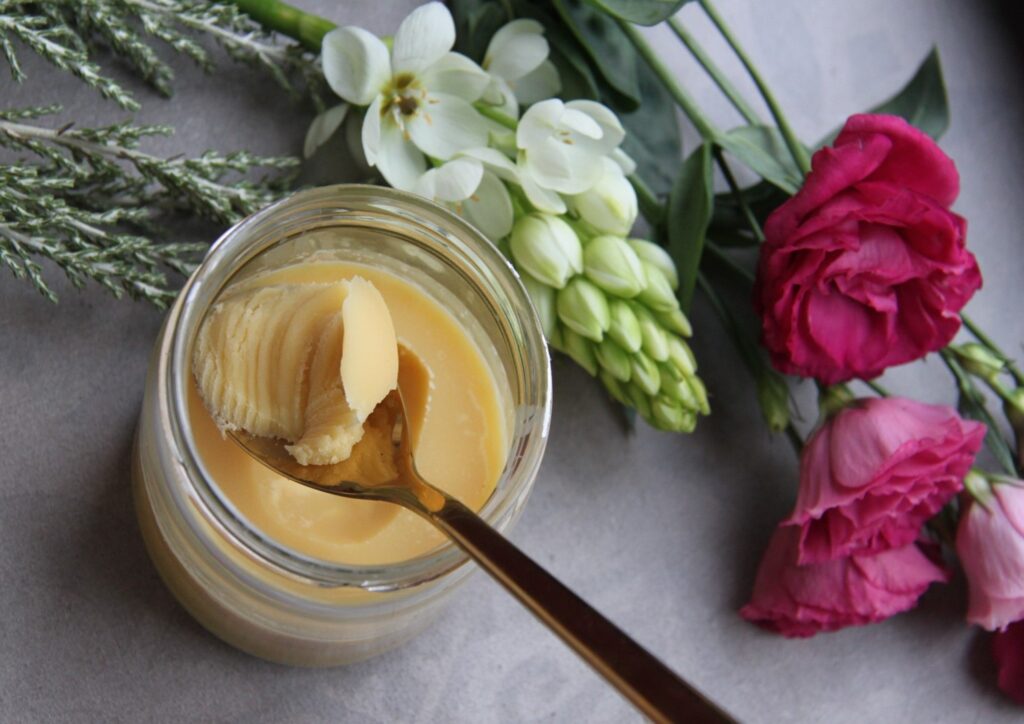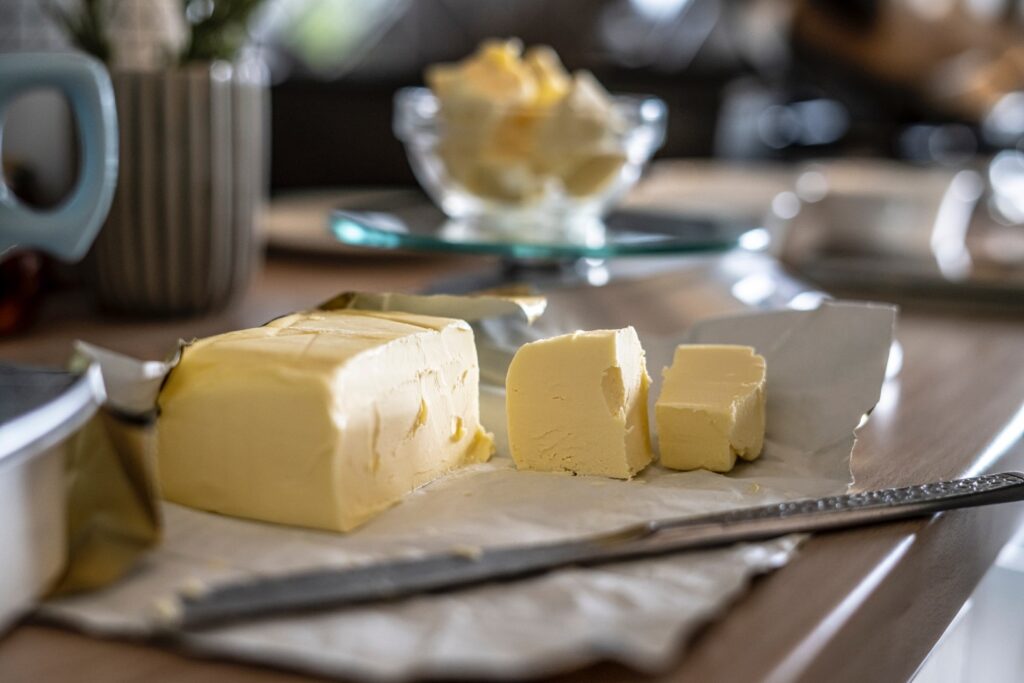Shea butter, often referred to as “women’s gold” or “nature’s miracle,” is a remarkable natural substance that has been cherished for centuries in Africa for its numerous benefits and versatile uses. Derived from the nuts of the African shea tree (Vitellaria paradoxa), shea butter has gained global recognition and popularity for its skincare, culinary, and medicinal applications.
Shea butter’s history is deeply rooted in the heart of Africa, where it has been utilised for centuries. The shea tree, often referred to as the “karite tree” in West Africa, grows predominantly in countries such as Ghana, Nigeria, Burkina Faso, and Ivory Coast. Indigenous communities, particularly women, have played a vital role in the traditional production of shea butter, and this process is deeply interwoven with African culture and traditions.
The Production Process
Shea butter production involves several stages, each of which contributes to its unique properties and purity. Here’s a more detailed look at the production process and its cultural significance:
- Harvesting: The process begins with the collection of ripe shea nuts, which are handpicked from the trees by local women. This labour-intensive work often forms an essential part of the income for these communities, and it’s a skill that has been passed down through generations. The gathering of shea nuts is a communal activity that strengthens social bonds among the women and is often accompanied by songs and stories that celebrate the cultural heritage of the shea tree.
- Washing and Drying: The harvested nuts are carefully washed to remove dirt and impurities and are left out to dry in the sun. This part of the process often includes ceremonial rituals that express gratitude for the shea tree’s bounty and invoke the blessings of the ancestors.
- Crushing and Roasting: After drying, the nuts are cracked and roasted. This process enhances the flavour and colour of the shea butter and contributes to the unique, nutty aroma that is often associated with traditional African cooking.
- Grinding: The roasted nuts are then ground into a paste, which is mixed with water to form a thick, oily substance. The grinding process is often a community event where women gather to share stories, laughter, and wisdom while working together.
- Boiling and Separation: The paste is boiled to separate the fat from the oil. The fat is then skimmed off, leaving behind the shea butter. This step, too, carries cultural significance, with traditional songs and chants accompanying the process.
- Cooling and Solidification: The shea butter is allowed to cool and solidify, resulting in a creamy and luxurious final product. This is often the moment of pride for the women involved, as they witness the transformation of their collective effort into a valuable resource for their families and communities.

The Versatile Uses of Shea Butter
Skin and Hair Care: Shea butter is a cornerstone of natural skincare products. It’s a fantastic moisturiser, thanks to its rich content of fatty acids and vitamins A and E. It soothes dry, flaky skin, helps reduce the appearance of scars, and is effective in preventing and treating stretch marks. In Africa, the use of shea butter in skincare is not just about physical beauty but also about embracing natural beauty and connecting with ancestral traditions.
Anti-Inflammatory and Healing Properties: Shea butter has anti-inflammatory properties and can provide relief to those with skin conditions such as eczema and psoriasis. It also accelerates the healing of wounds and burns, and in African cultures, it is often applied as a soothing balm with deep-rooted healing traditions.
Sun Protection: While it’s not a substitute for sunscreen, shea butter offers a small amount of natural sun protection due to its inherent properties. This is especially valuable in Africa’s sunny regions, where shea butter has been used for generations to shield the skin from the harsh sun.
Cooking: In West African cuisine, shea butter is often used in the preparation of traditional dishes. It adds a unique, nutty flavour to soups, stews, and other dishes. Culinary traditions in Africa often revolve around shea butter, reflecting a deep connection between food, culture, and the environment.
Massage: Shea butter is an ideal choice for massage, as it glides smoothly on the skin, leaving it supple and moisturised. This practice is deeply rooted in many African cultures as a form of relaxation and bonding.
Lip Balm: Shea butter is commonly used in lip balms for its moisturising and protective qualities, serving as a simple yet essential element of everyday self-care.

Shea butter has gained immense popularity and is used in various skincare, haircare, and cosmetic products. Many big brands incorporate shea butter into their formulations to harness its moisturizing and nourishing properties. Here are some well-known brands that use shea butter in their products:
- The Body Shop: The Body Shop is renowned for its ethical and sustainable skincare products. They use shea butter in many of their body creams, lotions, and lip balms, promoting fair trade practices and supporting communities in Africa.
- L’Occitane en Provence: L’Occitane is known for its high-quality skincare products. They have a range of shea butter-based items, including hand creams, body creams, and lip balms, which are celebrated for their moisturizing effects.
- Nivea: Nivea incorporates shea butter into various body lotions, creams, and lip care products. Their Shea Daily Moisture body lotion is a popular choice for those seeking hydration and nourishment.
- Cocoa Butter Formula (Palmer’s): While known for their cocoa butter products, Palmer’s also includes shea butter in many of their formulations. Their Shea Formula products offer deep hydration and are particularly popular for addressing dry skin and stretch marks.
- Eucerin: Eucerin is a dermatologist-recommended brand that uses shea butter in some of its products, including body lotions and creams, known for their effectiveness in providing moisture and relief for dry and sensitive skin.
- Neutrogena: Neutrogena, a widely recognised skincare brand, incorporates shea butter into various body and hand creams, contributing to its reputation for effective moisturisation.
- Kiehl’s: Kiehl’s offers a wide range of skincare products featuring shea butter, such as their Creme de Corps body lotion, which is celebrated for its nourishing properties.
- Aveda: Aveda includes shea butter in some of their haircare and skincare products, with a commitment to using natural and sustainable ingredients.
- Burt’s Bees: Burt’s Bees is well-known for its natural and environmentally friendly products. They use shea butter in items like their body butter and hand creams.
- Clinique: Clinique uses shea butter in various skincare products to enhance their moisturising capabilities, particularly in their lip care and body lotion offerings.
- NARS: NARS uses shea butter in some of its cosmetic products, like lipsticks and lip balms, to provide a smooth and moisturising finish.
- Molton Brown: Molton Brown incorporates shea butter into their luxurious bath and body products, contributing to their reputation for quality and indulgence.
These are just a few examples of well-known brands that use shea butter as an essential ingredient in their products. Shea butter’s moisturising, nourishing, and skin-soothing properties make it a sought-after component in the cosmetics and skincare industry, and many brands are proud to include it in their formulations.
Shea butter is not just a natural product; it is a vital component of African culture and traditions. From the communal gathering of shea nuts to the shared labour during processing, shea butter is deeply intertwined with the daily lives and social fabric of African communities. Beyond its practical uses, shea butter symbolises unity, heritage, and the connection between people and the environment.
In many African societies, shea butter plays a significant role in rituals and ceremonies. It is offered as a gift during weddings, used in naming ceremonies for newborns, and considered an essential part of traditional medicine and healing practices.
The production and sale of shea butter also provide economic opportunities for women in these communities, empowering them and contributing to their financial independence.
Shea butter is a true gift from nature that continues to impact the lives of many. Its rich history, cultural significance, and versatile applications have earned it a place of honour in the world of natural remedies, personal care, and culinary delights. By using shea butter, we not only benefit from its numerous properties but also support the sustainable and fair trade practices that empower the communities who produce it. Whether you’re looking for healthier skin, and hair, or even exploring its culinary uses, shea butter is indeed a natural wonder worthy of its reputation, and it represents a living testament to the rich cultural heritage of Africa.
Sources




